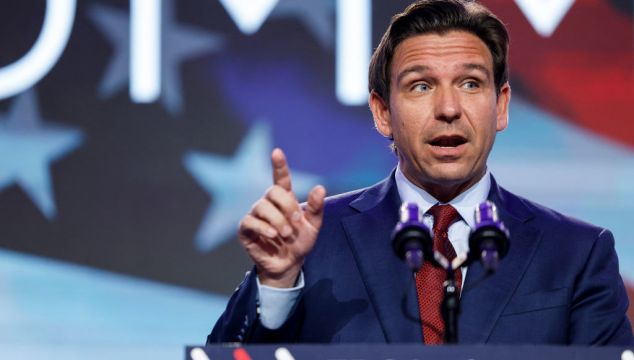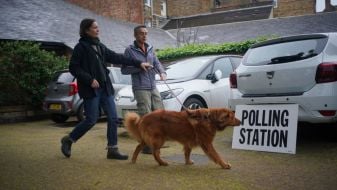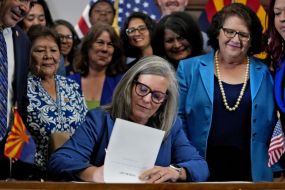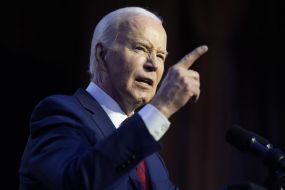Florida governor Ron DeSantis had a chance in April to address Donald Trump's growing momentum toward the 2024 Republican presidential nomination. Like several such opportunities, he let it pass him by.
Mr DeSantis was in Japan at the time on an international tour – a step often taken by presidential hopefuls to burnish their foreign policy credentials. Mr Trump had launched his own candidacy five months earlier and had spent much of that time attacking the governor, who was considered his most formidable potential challenger but had yet to declare.
Asked on camera about falling behind Mr Trump in the polls, Mr DeSantis awkwardly played coy. His eyes opened wide, and his head wobbled from side to side as he tried to avoid answering the question, in what became a viral video clip.
"I'm not … I'm not a candidate, so we'll see if and when that changes," the governor said.
Allies, advisers, and people close to the campaign now concede that Mr DeSantis' reluctance in the weeks before announcing his candidacy to engage with Mr Trump - on the Japan trip and elsewhere - was one of several costly strategic errors.
Reuters spoke to 16 political operatives and donors close to Mr DeSantis to reconstruct the roughly 10-week period from mid-March - before Mr Trump's first criminal indictment in New York - to Mr DeSantis' campaign launch on May 24th.
Several of the people said those weeks are crucial to understanding why Mr DeSantis, once seen as the party's best hope of moving on from the tumult surrounding Mr Trump, is now almost 40 points behind the former president, according to the latest Reuters/Ipsos poll.
The unforced errors in that early stage had a lasting impact on Mr DeSantis' campaign, they acknowledged.
After Trump jumped into the race late last year, Mr DeSantis waited for months to get in, dodging the subject of a presidential run with the media and refusing to respond to Mr Trump's attacks.
Mr DeSantis hoped a productive Florida state legislative session would boost his candidacy, according to the operatives and people close to the governor. Instead, it has saddled him with a restrictive abortion measure that has turned off some key donors.
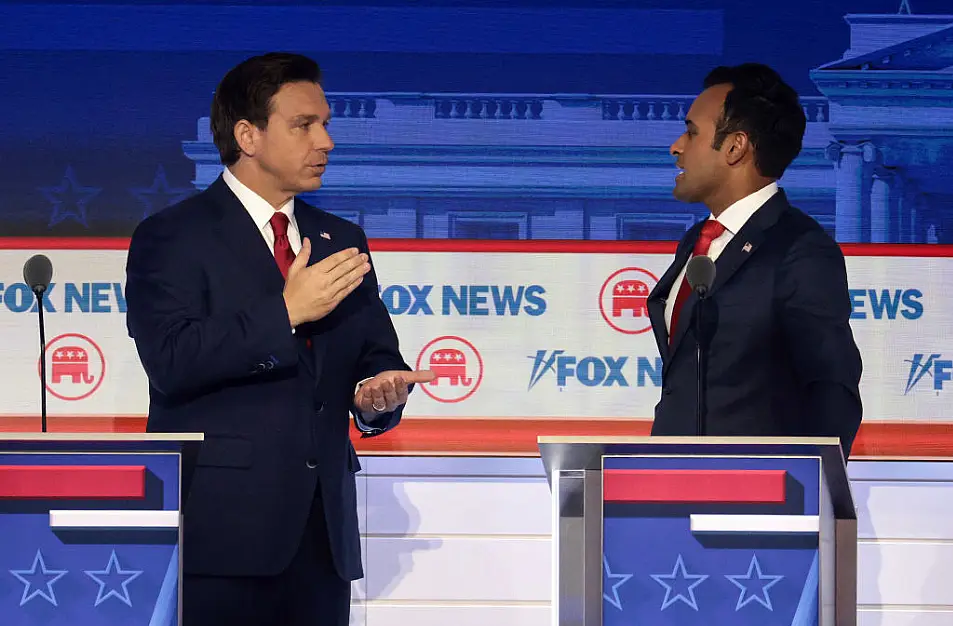
During those weeks, the gap between Mr Trump and Mr DeSantis mushroomed from roughly 8 percentage points to 34 points, according to data analysis website FiveThirtyEight. With Mr DeSantis now more than halfway from his official launch to the first primary contest in Iowa this January, many allies are asking what - if anything - the campaign should have done differently.
Eight advisers, allies, donors, individuals involved in his fundraising efforts or people close to Mr DeSantis told Reuters the governor placed too much emphasis on finishing Florida's legislative session without appearing to be running for president.
In hindsight, such a distinction likely did not matter to voters, those people said, and left Mr DeSantis vulnerable to attacks from Mr Trump, as he refused to personally defend himself from the former president's broadsides.
"What happened was we created this vacuum of vulnerability," said one person involved in the governor's strategy, who said he "100 per cent" wished the governor had declared a presidential bid earlier.
The DeSantis campaign told Reuters it did not want to discuss any past strategic decisions and was focused on preparing for the first nominating contests, which kick off with the Iowa caucus on January 15th. Mr DeSantis' aides say they have made some course corrections in the wake of the rocky stretch around the campaign's launch.
Trump filled the vaccum
Three advisers involved in formulating Mr DeSantis' strategy or close to top campaign staff, as well as some Florida-based donors, said that in hindsight they would have pushed Mr DeSantis to more forcefully respond to Mr Trump's attacks early on - including by moving up his formal launch.
When Mr DeSantis did jump in, it was via a glitchy launch on X, formerly known on Twitter, that even campaign staff privately concede was a disaster.
Mr Trump and his aides wasted no time in trying to fill the vacuum that Mr DeSantis had created. They embarked on a strategy to weaken Mr DeSantis in the eyes of Republican voters, particularly by portraying him as a threat to Social Security and Medicare - the healthcare program for seniors - because he supported restructuring the programs when he was a member of Congress.
"The president was dead set on attacking Ron DeSantis as early as possible," Chris LaCivita, Mr Trump's co-campaign manager, told Reuters.
"DeSantis has his dirty fingers all over senior entitlements. Like cutting Medicare, slashing Social Security. Even raising our retirement age," one TV ad released by MAGA, Inc., a fund-raising super PAC supporting Mr Trump, intoned.
According to a Reuters analysis, Mr Trump himself hit Mr DeSantis over Social Security and Medicare in speeches, interviews and on social media more than 40 times between November, when Mr Trump launched his campaign, and Mr DeSantis' announcement in late May.
Mr LaCivita said the Trump campaign tried to take advantage of the fact that DeSantis was at that point still largely unknown by a large swath of the Republican electorate.
"When when you have so little name ID in that position, you are essentially a blank canvas, and you can sit around and wait for your opponent to paint their picture, or you can paint it for him," Mr LaCivita said.
As Mr DeSantis continued to delay his entry, his donors were getting restless. One prominent donor complained to Reuters in March that Mr DeSantis was not "cranked up" enough. "They really haven't started hammering Trump," the donor said.
"At least 50 per cent of the problems that the DeSantis campaign has faced has come because of Trump's messaging," said Ford O'Connell, a Republican strategist in Florida. "If DeSantis tripped and fell on the campaign trail, Trump's people made you know it happened."
Not a candidate
Mr DeSantis had his own timetable for launching his candidacy and he would not be stampeded by Mr Trump into moving earlier, according to interviews with two people close to the governor.
Mr DeSantis, who painted himself as a man who could get things done without Mr Trump's drama, wanted to wait until the Republican-controlled legislature in Florida passed bills that he could sell on the campaign trail.
Some of those bills were connected to Mr DeSantis' "anti-woke" crusade, such as expanding the state's ban on teaching gender-identity concepts. Others were cherished conservative policy goals, such as loosing restrictions on concealed weapons.
But the legislative session has become best known for an abortion bill that proved repellent to some major donors who worried that the measure was so restrictive that it would turn off moderate voters and make Mr DeSantis unelectable.
Conservatives in the Republican-dominated legislature passed a ban in April that would outlaw the practice at six weeks, among the most restrictive in the nation. While Mr DeSantis did not lobby for the bill, he had vowed during his re-election campaign to sign whatever measure was presented to him. He ended up signing the bill at night with little fanfare.
In August, hotel entrepreneur Robert Bigelow, the biggest individual donor to the main pro-DeSantis super PAC, told Reuters he was cutting the governor off in part due to his abortion stance.

People close to Mr DeSantis told Reuters that it has been difficult at times to square donors' unhappiness over the ban with the campaign's desire to appeal to religious conservatives. The campaign is staking much of its future on Iowa, where conservative evangelicals, Catholics and Lutherans make up much of the voting base.
Mr DeSantis' reluctance to enter the race earlier in the spring caused other headaches. He avoided personally seeking endorsements from any of the 20 Republican lawmakers in the US Congress representing Florida, according to two people with knowledge of the matter, in part because he thought doing so might seem impolitic since he had not officially declared his candidacy.
Instead, he had a Tallahassee-based ally named Ryan Tyson reach out, those people said. Meanwhile, Mr Trump was working the phones and hosting lawmakers at his Mar-a-Lago estate in Florida, seeking their support.
Mr DeSantis' failure to talk to those lawmakers directly, those people argued, likely contributed to much of the delegation coming out in support of Mr Trump in mid-April. The endorsements helped drive a narrative that Mr Trump's nomination was inevitable, they said.
Lessons learned
Aides say Mr DeSantis' campaign has sought to make some strategic adjustments. After initially eschewing appearances in mainstream media, the governor has regularly sat for interviews to raise his profile and push back at Mr Trump, according to two people close to the governor.
Mr DeSantis has also leaned into small-scale retail politics, hoping to give voters a better sense of him at a personal level. He is laser-focused on trying to stop Mr Trump's momentum by winning the first Republican nominating contest in Iowa.
The midwestern state uses a caucus system, during which Republicans show up to local meetings to express their candidate preference.
Mr DeSantis' allies say that could help them as the system tends to favor campaigns with sophisticated operations promoting turnout.
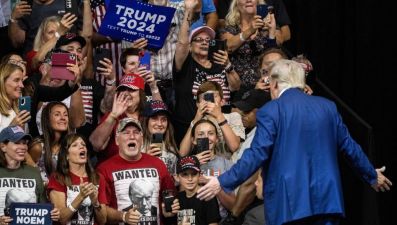
"The reality is: Just be steady. Be disciplined. Outwork the competition and organise. That's how you win in Iowa, and that's exactly what we're doing," David Polyansky, a top DeSantis adviser, told Reuters.
Evan Power, vice chairman of the Florida Republican Party who is remaining neutral in the race, said he doesn't think it would have made much of a difference if Mr DeSantis had entered the race earlier.
"No matter what he was going to do, these guys were going to attack him out of the gate," Mr Power said.
Even so, Mr Power conceded that Mr DeSantis did not need to wait for the legislative session to wrap up in May. "I don't think it was vital, but that was the strategy he wanted. It wasn't necessary."
